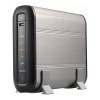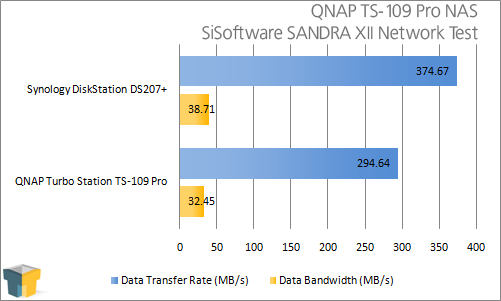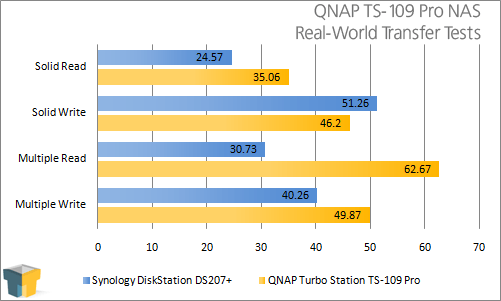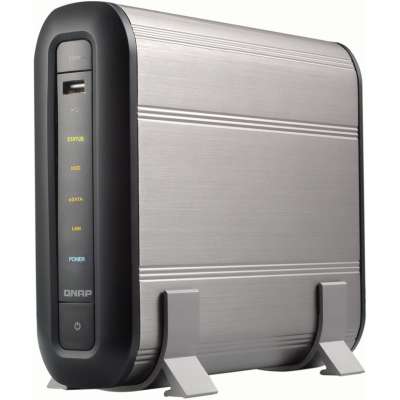- Qualcomm Launches Snapdragon 4 Gen 2 Mobile Platform
- AMD Launches Ryzen PRO 7000 Series Mobile & Desktop Platform
- Intel Launches Sleek Single-Slot Arc Pro A60 Workstation Graphics Card
- NVIDIA Announces Latest Ada Lovelace Additions: GeForce RTX 4060 Ti & RTX 4060
- Maxon Redshift With AMD Radeon GPU Rendering Support Now Available
QNAP TS-109 Pro NAS

Network storage if growing more popular each day, and thanks to that, there are countless NAS boxes to choose from. We take our first look at a QNAP offering, that proves you do get what you pay for. This single-bay NAS offers pure silence, a great feature-set and simple setup.
Page 5 – Testing, Final Thoughts
We are in the middle of reevaluating the way we test the performance of the hardware in our networking reviews and because of this, we have added one addition test to the list. Not only will we be using our tried and true real world file transfer but will also be using a folder of the same size consisting of 361 individual files. This will not only give us a good idea of how well the TS-109 Pro performs under large data transfers but also how well it performs in more day to day situations of transfers consisting of individual files.
While most will never transfer hundreds of files at a time, keeping both the test folders the same size will allow us to keep track of how the performance compares across the tests.
Another addition to our testing methodology is the Sandra Network Bandwidth benchmark. While synthetic, when the same version is ran on all hardware involved in the test, it should at the very least give us an idea of how the performance of one device compares to that of another. Synthetics should often be taken with a grain of salt but it will be interesting to see how well the TS-109 Pro stacks up to our comparison subject, the Synology DS207+.
The hardware uses in these tests consists of:
Test System
- Motherboard: abit IP35 Pro
- Processor: Intel E6600
- Memory: Super Talent 4GB DDR2 PC2-6400
- Storage: Seagate Barracuda 320GB 7200.10
- Video Card: XFX 8800 GT
- Power Supply: Hiper 880W
- Chassis: Hiper Anubis
- Router: D-Link DGL-4500 Gigabit Wireless N Gaming Router
The network card used in these tests was the on board Realtek RTL8169/8110 gigabit Ethernet controller. The abit board used in the testing has a pair of these Ethernet jacks on them but only needing one, the other was disabled. Jumbo frames have been disabled as well to provide the reader with as close to an environment as most would have at home.
The comparison NAS used in these tests is the Synology DS207+. The DS207+ is a dual bay NAS but for the sake of fairness, only one is being used. Both devices contain similar 500 MHz processors as well as 128MB of onboard memory. The QNAP product uses DDR2 while the Synology device uses DDR. All in all, the two are similar enough that a good opinion should be able to be drawn from our results.
Starting out with our Sandra results, we were surprised to see the DS207+ jump out ahead in every category. It will be interesting to see if these performance numbers carry over into our real world tests.

In our real world tests, we have taken a single 585 MB .iso of our Windows XP SP2 install disk and have transferred it to and from the pair of NAS boxes. This is the same file used in all of our recent reviews and will continue to be used to allow us to grow in our testing comparisons. To add to this test, we have also created a folder of 361 files, totaling out at 585MB. This should allow us to gauge how well the devices handle multiple file transfers at once. As in our other reviews, all tests were ran three times each and the totals of those runs were averaged out.

Interestingly enough, the TS-109 Pro fell behind the DS207+ in every category but the solid write. While most were close, the multiple reads worried us a bit as it took twice as long to pull the 585MB folder than it did with the Synology DS207+ with only one drive installed! Leary of our original results, we ran the test again multiple times with all ending in the same result.
Final Thoughts
On paper, the TS-109 Pro looked like a giant and in many regards; it lived up to those claims. With its low wattage footprint (QNAP claims that the TS-109 Pro only uses 6.6w of power when in sleep mode and a paltry 14.4W when in use) and full list of features, the TS-109 Pro is definitely a winner in our book. What has impressed me the most though was the small features that we haven’t seen in other devices like hard drive block scanning, disk checking, a completely silent design and network recycling bin. It’s these features that have sold me on the QNAP TS-109 Pro.
Performance of the NAS was lower than we expected and because of this we were a bit let down. That said, the performance of the TS-109 Pro wasn’t bad either and the good in the NAS far out ways the bad that we uncovered.
Many have stated that they are a bit uncomfortable with the completely silent conductive cooling approach. For me however, this doesn’t bother me a bit. While a fan might give many peace of mind, our test drive never exceeded 46 degrees Celsius, and for a hot 750GB drive, that’s reasonable. Compare this to the 39 degrees that the drive in the Synology NAS hovered around and the trade off of a completely silent NAS isn’t that hard of a pill to swallow. The all-aluminum casing does an adequate job of keeping our test drive well within its threshold temperatures and as we have said before, has done so without so much as a whisper.

The major selling points of the TS-109 Pro will not be the performance numbers. For most, the biggest allure of the TS-109 Pro is its rather large feature set. Offering many features that anyone who has worked in an office can appreciate, QNAP has done a great job of adding just what SOHO users will need in a NAS device. Theoretically a company can eliminate the need for a file server and an FTP server with a simple purchase of a device like the TS-109 Pro. For home users though, I would suggest the Pro’s smaller brother, the TS-109. Containing the same hardware, the TS-109’s biggest difference is its lack for active directory support.
On a multimedia front, the built-in TwonkyMedia server enables those with DNLA certified media players to pull songs, video and pictures off of the TS-109 Pro. Those with friends and family scattered across the globe will also appreciate the easy photo sharing feature and many will love download station perfect for setting up large BT downloads and forgetting about them until they complete.
At the end of the day, we weren’t blown away by the performance of the TS-109 Pro but we were left very impressed. Similar to those the Synology brand of NAS, the features found on the TS-109 Pro are extensive and should be able to keep most everyone happy whether in an office or in a home. The most critical role of a NAS is to be a convenient, reachable backup source and the TS-109 Pro does that in spades. Holding up the 1TB hard drives, and being able to sync with attached drives over eSATA or USB, the single drive TS-109 Pro is suddenly a RAIDable NAS. Keeping all of your eggs in one basket has never been, nor ever will be, a good idea and allows the user to backup the contents of their TS-109 Pro over the USB or eSATA line is a great idea.
All in all, the TS-109 Pro from QNAP has earned a 9 out of 10. With plenty of features to go around, very few will find the TS-109 Pro to not live up to their expectations. Available online for just under $300, the TS-109 Pro isn’t cheap but it’s well worth every penny.
Pros
- Silent
- Decent performance
- Reliable
- Multi-functional
- Lots of features
- Network Recycle Bin option
- Top quality build
Cons
- Pricey for home users
- Not the best performer in our tests
If you have a comment you wish to make on this review, feel free to head on into our forums! There is no need to register in order to reply to such threads.

Support our efforts! With ad revenue at an all-time low for written websites, we're relying more than ever on reader support to help us continue putting so much effort into this type of content. You can support us by becoming a Patron, or by using our Amazon shopping affiliate links listed through our articles. Thanks for your support!




